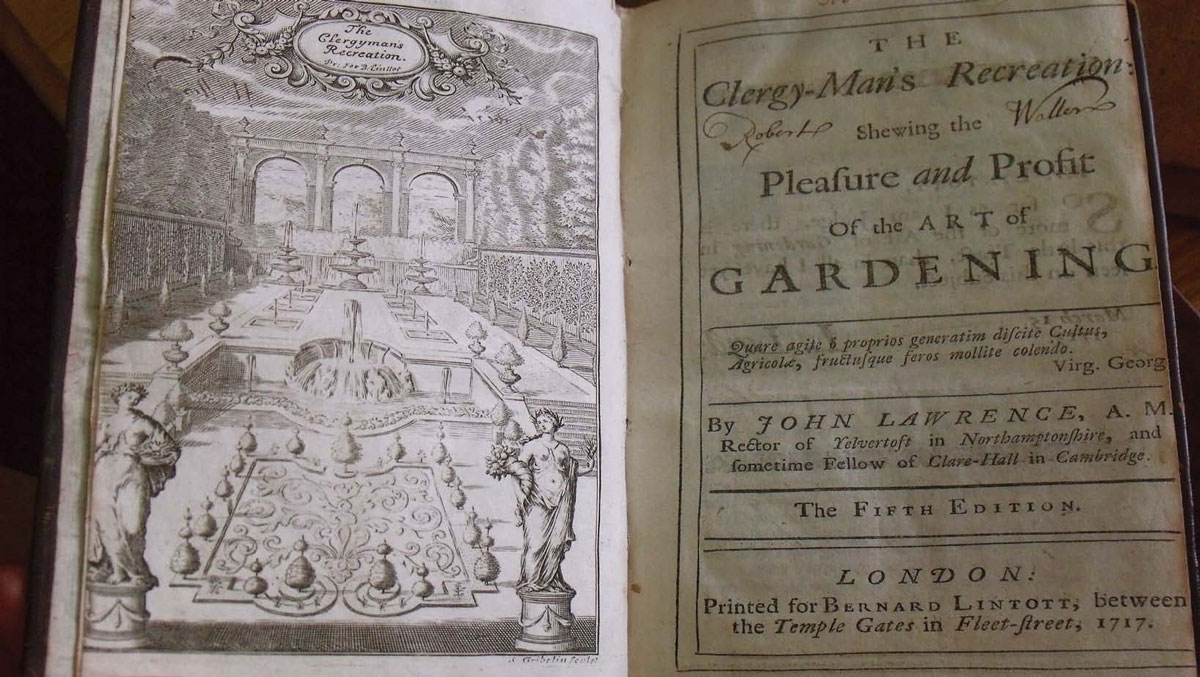The Stories Behind the Seeds
Seed Savers Exchange grows a flourishing library
The Robert Becker Memorial Library occupies the top floor of the Seed Savers Exchange administration building in rural Decorah, at one end of a trail that winds past gardens and through wooded groves. In the summer months, the nonprofit’s ancient White Park cattle graze an adjacent field; in the winter, snow swirls across the hills visible from windows at one end of the room.
Amish builders crafted the post-and-beam building that houses the library, and the cozy loft space is packed with reference materials and memorabilia: vintage seed catalogs and seed packets, glass-cased displays protecting rare volumes, sleeves of photo slides, and floor-to-ceiling shelves stacked with some 4,500 books collected during the nonprofit’s nearly 40-year history.
And, there’s the jar of peanut butter M&Ms.
When librarian Bill Musser joined the Seed Savers staff in 2010, he noticed that colleagues rarely stopped in to explore the collection. So, he set out a jar of candy. As employees started coming by for snacks, Musser introduced them to the rich resources held in the facility.
“Part of my job is to change the culture of the library,” says Musser, who studied library science at the University of Iowa and has also worked at Luther College and Vesterheim Norwegian-American Museum. “We want them to see this as a place where they can go to get information that they may not even know they need.”
Seed Savers Exchange grows, shares and collects heirloom seeds, which are those harvested and passed between generations. Such seeds may have a lineage of 50 years or more, and gardeners who share them frequently pass down stories of the seeds’ origins, as well. More than 13,000 Seed Savers members source seeds from the collection via the organization’s annual yearbook, which listed approximately 13,000 unique varieties in 2014. Members of the public can also purchase some 600 heirloom and open-pollinated varieties through the Seed Savers catalog.
The Robert Becker Memorial Library took root during the organization’s earliest days at its 890-acre Heritage Farm location. Seed Savers co-founders Kent and Diane Ott Whealy moved their fledgling nonprofit to this corner of northeast Iowa after launching the organization in 1975. The first office there was in the farmhouse basement, and, for a few years, they stashed gardening books, journals and periodicals where they could find the space.
“It was sad to see those beautiful books in boxes under the steps,” says Diane Ott Whealy.
When the Seed Savers leadership team decided to build new offices in the mid 1990s, they set aside the structure’s top floor for the library. The organization’s book collection was growing, as was the need for information about heirloom seed varieties. Details about those seeds were often tucked away in historic gardening books.
Current Seed Savers board member, botanical antiquarian and American Botanist Booksellers owner Keith Crotz donated several such publications in the organization’s early years.
“With heirlooms, it’s about literature,” says Crotz. “What we think of as new garden methods today are all at least 100 years old if not older.”
He, along with the organization’s founders, also recognized the importance of expanding Seed Savers’ research collection. Crotz was close friends with Cornell University professor and New York Agricultural Experiment Station vegetable extension specialist Robert Becker, one of the earliest Americans to write about the importance of heirloom and open-pollinated plants. Becker built his own collection of significant historical and contemporary books covering horticulture, botany, and agriculture.
When Becker passed away after an accident in 1996, his wife, Fay, their children, and Crotz decided that Seed Savers would receive his 650-volume library. The organization dedicated the Robert Becker Memorial Library in October 1998.
“When [Robert Becker] was writing about heirlooms, he was ahead of the game,” says Diane Ott Whealy. “He realized the significance of it, and now, looking back, he really did a wonderful service by keeping these books intact.”
Since the library’s dedication, Seed Savers has continued enhancing its collection, making it more accessible to members of the public seeking information and to employees cataloging seeds and exploring agricultural practices.
“It has become a research center,” says Crotz. “Sure, you can bring things up electronically, online, but…the great research discoveries are made when you’re sitting at the table with a book in front of you. You turn a page and all of sudden you have an ‘aha’ moment. That’s the importance of the library at this point.”
Bill Musser’s task as the Seed Savers librarian is to manage and organize the crop of publications housed at the facility. That includes materials covering everything from gardening and genetic diversity to sustainable agriculture, conservation and orchard preservation. When he started his position four years ago, books were shelved in alphabetical order by last name and listed on a single spreadsheet. Unless users knew the specific title and author of the volume they needed, browsing by subject matter was nearly impossible. Musser’s cataloging work makes information more accessible.
In addition, he brings order to a collection that extends far beyond books. The Robert Becker Memorial Library features periodicals, manuscripts, audiovisual items and even binders packed with personal papers. Works in the 1,500-volume special collections inventory date back to the late 16th century. Approximately 600 pre-1950 seed catalogs provide a counterpoint to hand-painted plate books carried by seed salespeople in the late 1800s. A volunteer is entering information into a database that holds approximately 5,000 photographic slides, which will further facilitate searches. And, the Seed Savers Exchange archives and annual catalogs are also housed among the stacks.
On a typical weekday, the library guest list might include staff members researching varieties in the Seed Savers collection, whether they need images or information on pathology and plant maintenance. Employees often source graphics for event invitations and special projects, as well. Illustrations from one 1800s volume, for example, inspired the design of a dedication wall in the nearby Lillian Goldman Visitors Center.
Library materials also shape member publications and educational outreach. Ott Whealy referred to the organization’s archives when writing her 2011 book, “Gathering: Memoir of a Seed Saver,” and Musser will create exhibits celebrating Seed Savers’ upcoming 40th anniversary using historic photos and texts from the collection.
Other users include visiting scholars and historians, along with classes from Luther College. After exploring Seed Savers’ German origins (the organization’s earliest seeds included morning glory and German pink tomato seeds that Ott Whealy’s grandfather brought to Iowa from Bavaria), students studying the language discuss German gardening phrases, grow their own produce and explore the library’s collection.
Of course, patrons aren’t the only people who discover surprises in this loft on top of the hill. One person combing through books in the Robert Becker Memorial Library happened across a handwritten note from New York Tribune founder and editor Horace Greeley. In the 1800s message, addressed to a gentleman named Joshua Norton, Greeley thanked Norton for sending peaches and pears.
“That note was in the records, but we didn’t know,” says Musser. “There are so many little pieces of paper tucked in all these books. It’s fun to think about what else might still be there.”
WHEN YOU GO
Members of the public may use materials at the Robert Becker Memorial Library at Seed Savers Exchange for on-site research. The facility is located at Heritage Farm, 3094 North Winn Road, Decorah. For more information, visit SeedSavers.org.





